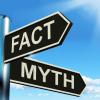When a Physician Becomes a Patient: A Husband Recalls His Wife’s Journey Through Cancer
In March 2013, John’s wife Lori found a lump in her breast. Lori, a radiation oncologist, soon went from giving cancer care to receiving it. In this guest post, John talks about how to navigate a cancer diagnosis, a journey for which we are all ill-prepared.










